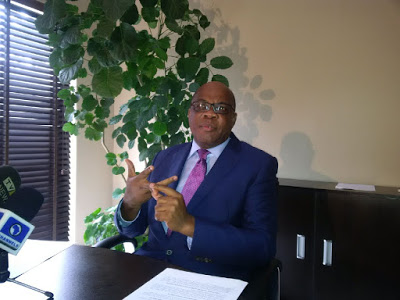 |
| Dr. Olisa Agbakoba |
Rights Activist, Dr. Olisa Agbakoba has said that Nigeria’s economy is facing
a recession in the face of dwindling oil revenue, and a challenged manufacturing
sector plagued by funding gaps.
Agbakoba stated this at an
interactive forum convened by the Olisa Agbakoba Legal in Lagos.
anti-corruption crusade and the Treasury Single Account initiative had saved
over 3 trillion Naira, the benefit must translate into using the milestones to
stimulate the economy.
Central Bank of Nigeria (CBN) played a significant role of ‘’creating money by
buying securities such as government bonds from banks, with electronic cash
that did not exist before.
size of bank reserves in the economy by the quantity of assets purchased—hence
“Quantitative” Easing.
supposed to stimulate the economy by encouraging banks to make more loans.
money and buy assets to replace the ones they have sold to the CBN.
rates, which in turn boosts investment,” Agbakoba said.
blamed the non-achievement of a diversified economy on dearth of infrastructure
to support economic activities in various sectors.
however, advised that Nigeria should revisit the option of receivable
financing.
her oil to receive loan from countries like China, should be revisited.
by receivable financing. It is only such huge receipt of funds that could plug
the serious infrastructural deficit that impede diversification in Nigeria.”
to him, the ‘’comatose state’ of the
manufacturing sector resulting from high cost of doing business had made job
creation difficult, even as small businesses are staved of capital.
have a vibrant manufacturing and real sector.
in a comatose state with the Manufacturers Association of Nigeria constantly
complaining of the need to reduce the cost of doing business.
because of absence of capital: they cannot easily access loans from banks.
Interest rates are high and banks are shy to lend because of the problem of bad
debts, exacerbated by inefficient regulatory environment,” Agbakoba said.
the importance of getting the Financial Services Sector right, which he said
should include having the CBN focus on lending, interest rate and exchange and
not being overburdened.
advising that market forces be allowed to determine the exchange value, while
the CBN should not restrict the flow of foreign exchange, an act that restricts
critical stakeholder’s participation.
does not have enough, but if we expand the space, we would be surprised that
many Nigerians can participate and increase the stock.
legal framework to encourage this participation, subject to Money laundering
Rules.”
Nigeria’s State-owned Public Enterprises, saying that the privatization model
had not been successful in Nigeria’s case, compared to a country like China.
entities in Nigeria could serve as a model. It is urgent therefore, that
Nigeria reviews her Public/Private Economy.
overarching sectors of the Economy. There is need for a strong Public/Private
Sector Framework.”
rating as the 20th largest economy in the world, noting that
reviewing the nation’s public/private economy would go a long a way to turning potentials
into reality and moving the economy forward.
